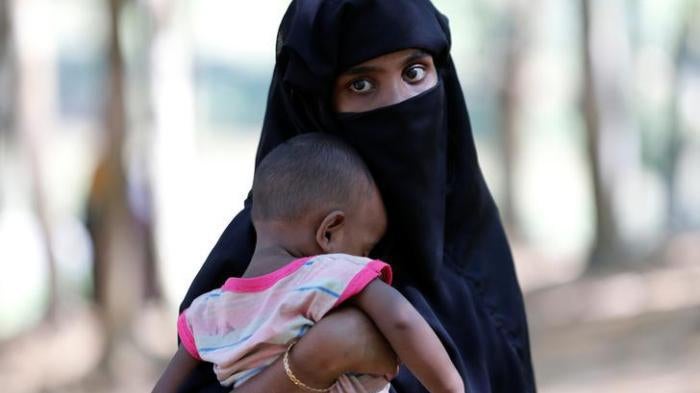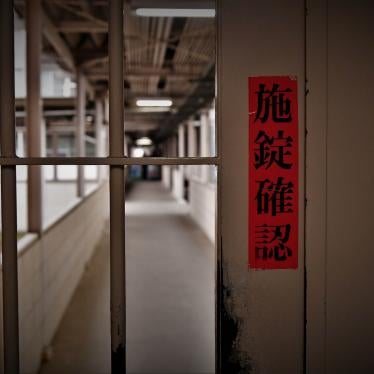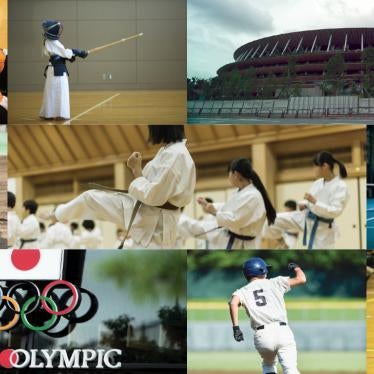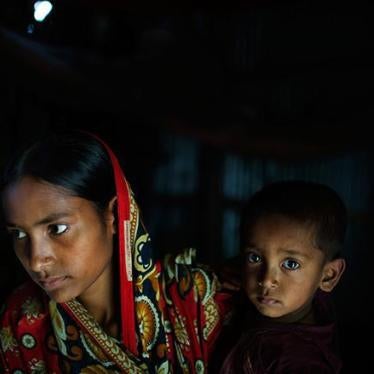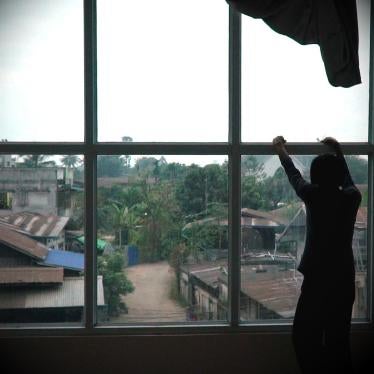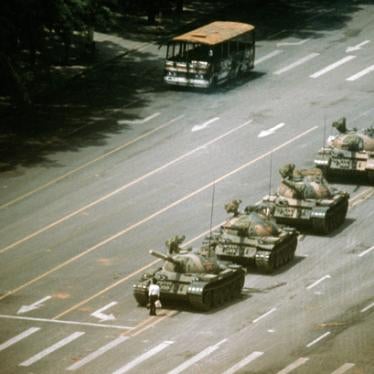(ニューヨーク、2017年2月6日)ビルマ政府の治安部隊は2016年後半からのラカイン州北部での治安作戦においてロヒンギャの成人女性と少女にレイプなどの性暴力をはたらいており、わずか13歳の少女も被害に遭ったと、ヒューマン・ライツ・ウォッチは本日述べた。ビルマ政府はラカイン州北部での人権侵害の訴えについて、ロヒンギャの成人女性と少女への計画的とも思われるレイプも含め、独立した国際調査をただちに認めるべきだ。
ビルマ国軍と国境警備隊は10月9日から12月中旬にかけて、レイプ、輪姦、権利侵害にあたる身体検査、性的暴行などをマウンドー郡の少なくとも9つの村で行ったと、ヒューマン・ライツ・ウォッチは述べた。サバイバーと被害者は、国軍と国境警備隊の部隊を制服やスカーフ、腕章、記章で見分けており、治安部隊が集団で暴行をはたらいたことを詳しく述べた。ある者が女性をレイプしているときに、他の者がその女性を押さえつけたり、銃口を突きつけて脅したりした事例もあった。多くのサバイバーが暴行の最中に民族や宗教を根拠とした侮辱や脅迫を受けたと話している。
「ロヒンギャの成人女性と少女に対する身の毛のよだつ攻撃は、ビルマ国軍が女性に対する性暴力を長年にわたって行ってきた不愉快な歴史に残虐な1章を新たに付け加えるものだ」と、ヒューマン・ライツ・ウォッチ緊急事態部門上級調査員プリヤンカ・モタパルティは指摘する。「軍と警察の司令官は、あらゆる権限を行使してこうした犯罪を止めさせ、関与した人物を処罰すべきであり、そうしていないのであれば責任を追及されなければならない。」
2016年12月から2017年1月にかけて、ヒューマン・ライツ・ウォッチの複数の調査員がバングラデシュで女性18人(うち11人が性的暴行のサバイバー)と男性10人に聞き取りを行った。男女17人(性的暴行のサバイバー女性も含む)が性暴力を目撃したと述べた。被害者には聞き取り対象者の妻や姉妹、娘もいた。今回の調査でヒューマン・ライツ・ウォッチが記録したレイプなどの性暴力は全部で28件。1つの事件で被害者が複数のものもあった。国連人権高等弁務官事務所(OHCHR)が2月3日に発表した報告書によれば、国連の調査者が聞き取りを行った女性101人のうち半数以上がレイプなどの性暴力の被害を受けていた。報告書は全部で204件の聞き取りに基づいて作成されており、レイプなどの性暴力を含む暴行は「広範かつ計画的に行われていたように思われるもので、人道に対する罪が犯された可能性が極めて高いことを示している」と結論づけた。
ロヒンギャの過激派による2016年10月9日の国境警備隊詰所襲撃事件を受け、ビルマ軍はラカイン州北部で一連の「掃討作戦」を実施した。治安部隊は成人の男女と子どもへの即決処刑や財産の略奪を行い、家屋など少なくとも1,500軒を焼き払った。ロヒンギャ69,000人以上がバングラデシュに逃れる一方、23,000人がマウンドー郡で国内避難民となっている。
複数の女性から、兵士たちが村や自宅を取り囲み、外に村人を集めて男女を分け、最大数時間にわたって人びとを拘束したときの様子が語られた。兵士たちが村人に発砲し、成人女性と少女を一人または複数でレイプしたケースが多かった。ロヒンギャ女性のアイシャさん(20代、仮名)はヒューマン・ライツ・ウォッチにこう述べた。「兵士たちは女性たちを一カ所に集めると竹の棒で殴り、軍靴で蹴りつけました。殴る蹴るの後、兵士たちは[私のほか]、私と同年代の女性15人だけを別のところへ連れて行きました。[兵士たちは]私たちを一人ずつレイプし、着ているものをはぎ取ったのです。」
村人の自宅に侵入した治安部隊が家人を殴打あるいは殺害し、女性たちをレイプする事例も多かった。ヌアさん(40代、仮名)によれば、20人の兵士が自宅に押し入り、ヌアさんと夫を外に引きずり出したという。「庭に連れて行かれると別の2人の兵士が私の頭にライフル銃をつきつけ、衣服をはぎとり、レイプしたのです…。兵士たちは私の目の前で[夫を]手斧で殺しました。さらに3人の男からレイプされました…。しばらくするとひどい出血がありました。下腹部に強い痛みを、また全身にも痛みを感じました。」
こうした性暴力は手当たり次第に、あるいはたまたま行われたものではなく、民族と宗教を理由の1つとした、ロヒンギャへの綿密に計画された攻撃の一環とみられると、ヒューマン・ライツ・ウォッチは指摘した。多くの女性がヒューマン・ライツ・ウォッチに対し、兵士が自分たちを脅し、罵るときにロヒンギャ・ムスリムであることを取り上げた表現を使ったという。殴打やレイプの最中に「このベンガル人女」「このムスリム女」などと叫んでいたのだ。「お前はムスリムだから殺す」と脅された女性もいた。治安部隊から「テロリストをかくまっているか」と聞かれ、そんなことはないと答えると自宅に踏み込まれて殴られ、レイプされたとの証言が複数の女性からあった。自宅で兵士たちにレイプされかかったと話す20代の女性は、兵士たちにこう言われたという。「俺たちを殺すためにガキを育てているんだろう。だからガキどもも始末してやる。」
ビルマ政府当局には、ヒューマン・ライツ・ウォッチなどのNGOが報告する性暴力などの人権侵害の訴えについて本格的な調査に向けた明確な動きはない。マウンドー郡の状況について第一副大統領が委員長を務め、新旧政権高官から構成される国家レベルの調査委員会は2017年1月3日に中間報告書を発表した。委員会はレイプの訴えについて検討し、「現地の村人や女性たちに様々な方法で聞き取りを行った…[しかし]今までのところ法的措置に至る十分な証拠は[ないことがわかった]」と主張する。また人権団体の調査結果とは反対に、委員会は重大な人権侵害や宗教的迫害の報告を否定し、栄養失調の事例も認められなかったとした。
2016年12月26日、アウンサンスーチー国家顧問の情報委員会はプレスリリースを発表した。「マウンドー郡での暴力的な襲撃事件後を受けた治安部隊の地域掃討作戦下で女性がレイプされたとの噂」に関するものとされる。「ねつ造されたレイプ」という英文の画像が冒頭に配置されたこのリリースは、調査委員会がレイプ被害の有無について矛盾した証言をする女性2人に聞き取りを行っており、また村長たちは後でその証言に反論したと述べる。しかし委員会の現地訪問時の動画には、インタビュアーがうち1人の女性に対し、本人の経験ではなく、その女性が証言した別の女性への暴力行為について尋ねていた。ビデオに収められたその女性の証言には、聞き取りで嘘をついていることを示唆するものは何もない。この聞き取りは対決的な調子であり、性暴力被害者への聞き取り方法に関する一般的なガイドラインから外れた形で実施されているとみられる。当局が一連の聞き取りをこうした問題のある状況で行っている事実、また当局が聞き取り対象の女性の氏名や個人情報をマスコミに開示したタイミングも含め、この女性たちが被るリスクを考えると、情報委員会のプレスリリースの信憑性には重大な疑念が生じる。
「政府はこうしたレイプの訴えに異議を差し挟むことを止め、サバイバーが必要な支援や医療などの各種サービスを利用できるようにすべきである」と、前出のモタパルティ上級調査員は述べた。
性的暴行を受けたロヒンギャ女性たちは、望まない妊娠やHIV感染を防止し、その他の性感染症を治療する救急措置を受けることが難しいと、ヒューマン・ライツ・ウォッチは指摘する。ビルマ政府はラカイン州北部への支援を部分的に認めているが、民間人への国際支援は依然認めていない。レイプのサバイバーが当該地域に今もどのくらい留まっているのか、また彼女たちが適切な医療を受けているかはわからない。ヒューマン・ライツ・ウォッチが聞き取りを行った女性のうち、バングラデシュに来るまでの間に医療施設を利用できた人は1人もいなかった。またバングラデシュでも利用可能なサービスの情報がない、または子どもにケアを受けさせることができない、診療所までの交通費が自弁できないとの話が多くの女性たちからあった。
「政府はロヒンギャへのレイプなど様々な犯罪行為への調査を行っていない。このことはビルマの友好国やドナーに対し、一連の身の毛がよだつような人権侵害の真相を解明する上で独立した国際調査の絶対的な必要性を明白に示すものである」と、モタパルティ上級調査員は述べた。
Rape and Sexual Assault Against Rohingya Women and Girls in Northern Rakhine State
The following incidents took place between October 9 and mid-December 2016. Pseudonyms are used to protect those interviewed, as well as to protect their relatives who remain in Burma from possible government reprisals.
Cases of Rape and Gang Rape
Human Rights Watch interviewed nine Rohingya women who said that Burmese security force members had raped or gang raped them during attacks on their villages in Rakhine State. Several women described how security forces forcibly entered their homes, looted their belongings, and subjected women to invasive body searches before raping one or more women or girls in the family. Fatima, a Rohingya woman in her 20s, described an assault by soldiers against her and her young children in Kyet Yoe Pyin village in mid-November. She said:
Four soldiers attacked and suddenly entered the house. One grabbed the children, two of them grabbed each of my arms.… They were armed with rifles, pistols, small and long knives, and some were wearing ammunition belts.
My eldest [5-year-old] daughter screamed and said, “Please leave us.” … So they killed her … with a machete. They slaughtered her in front of me.
When they killed her, I became very upset. [The soldiers] said many things to me that I could not understand and put a gun to my head.… They kicked me in my hip and back, and beat me on the head with a wooden stick.
[Then] one of the soldiers tore off my clothes. Two soldiers raped me, one by one. They were about 30 to 35 years old. They touched too many places in a very painful way – they touched my chest, they touched my vaginal area. They did it quickly, they only opened their zippers – they didn’t take their pants off. When another soldier tried to rape me, I resisted. Then they burned my leg with plastic, they put it out on my leg.
Noor, in her 40s, said that about 20 soldiers stormed her home in the border town of Shein Kar Li in early December, and grabbed her and her husband:
Two of them held my arms tightly. I couldn’t move. They took me in the yard of the home. Another two put a rifle to my head, tore off my clothes, and raped me.… While they held me, my husband was also held. They slaughtered him in front of me with a machete. Then three more men raped me. I began bleeding severely. After some time, I didn’t know what was happening, I fell unconscious.… I regained consciousness the next morning. I took my gold jewelry, went to the nearby ghat [stairs leading to the river], and gave it to the boatman [so that I could cross to Bangladesh]. I walked there very slowly, as I was in pain. I had severe pain in my lower abdomen and pain in my whole body.
Witnesses also described security forces gathering women together in public areas – in paddy fields or school courtyards – and detaining them before selecting some women to rape. Ayesha, a woman in her 20s from Pyaung Pyit village, said:
They gathered all the women and started beating us with bamboo sticks and kicking us with their boots. In total they beat about 100 to 150 women, young boys, and girls. After beating us, the military took me and 15 women about my age and separated us [from the group].
They took us to a nearby school, kept us in the burning sun, standing in the field in front. They made us turn to face the sun. Then three soldiers took me to a nearby pond.
When they prepared to rape me, they opened their pants. All I could notice was their underwear. When one finished raping me, I resisted with my leg, and one of them punched me in the eye.… One of them kicked my knee and I got hurt. They also bit my face and scratched me with their nails.
I started bleeding. When I started severely bleeding from my genital area and leg, they left me. I became senseless. When I came to, I found my clothes torn around me. I found my skirt and wrapped my body in that.
Ayesha said that her abdomen and vaginal area had become red and swollen, and that she remained in pain for at least a week after the attack.
One woman in her 30s from Kyet Yoe Pyin village said that four soldiers raped her, then one raped her again by inserting the barrel of his rifle into her vagina.
Rape of Girls
Five people told Human Rights Watch they saw security forces raping or sexually assaulting girls as young as 13, or saw girls taken away, heard their screams, and learned soon afterward that they had been raped. Some of these victims were their family members.
Sayeda, a woman in her 40s from Kyet Yoe Pyin village, said that in mid-November soldiers gang raped her 16-year-old daughter in front of her, then burned her house:
After evening prayer time, the military came and surrounded our house, then entered. Three soldiers grabbed me and my [seven] daughters, and took us to the paddy field. They beat us with their rifles.
On the spot in front of me, four military raped [my eldest daughter]. Then one soldier took her to another place. When the soldiers attacked her, I grabbed my other daughters and ran. We ran into the bushes. Other people later told me she died. I didn’t see her body.
Amina, a woman in her 20s from Hpar Wut Chaung village, said that soldiers raped and killed her 13-year-old sister during a raid on their home in early December, as well as killing five other siblings. She said:
When they entered [our house], our brothers were sleeping on the veranda, and we [five sisters] were in the bed. They shot and killed my [brothers] and held the girls so they couldn’t move.
They instantly shot my younger sister in the head. While [another sister was] running away, they shot [her too].
They took my other [13-year-old] sister to another room and raped her there. We heard [her screaming]. She screamed, “Someone save me! He’s trying to take my clothes off!” What I saw from outside is that 10 more people entered that room with my sister.
Amina and her father managed to escape and fled to a neighboring village. There, her next-door neighbor who also fled told her that she had found Amina’s sister dead, without any clothes on.
Sexual Assault
Several women told Human Rights Watch that security forces subjected them to invasive body searches during village raids, either in their homes or while villagers were gathered in open fields. Soldiers put their hands underneath women’s clothes and painfully pressed their breasts and genital areas – searches that constitute sexual assault. They beat or slapped some women, and threatened them with machetes and guns. They also snatched gold jewelry women wore, and took money they kept in their blouses. Some women said they were searched twice.
Taslima, a woman in her mid-20s from Dar Gyi Zar village, said that in early November, after she fled to the nearby village of Yae Twin Kyun, soldiers came to the house where she was staying and dragged her and other women from the village out into the yard:
When [the military] entered the house, one soldier searched my body for gold and jewelry, and asked for money. When I didn’t give it to them, soldiers grabbed me and searched my body. They searched under my clothes … they pressed my chest very badly. They found where I hid my money in my chest. They also touched my hips and sensitive area [genital area].
She said they then dragged her outside: “There were about 10 to 12 women standing in the yard, around the same age as me. They touched us all, very bad touches. They used [their rifles] and machetes to threaten us.”
Sara, from Sin Thae Pyin village, said that in late November about 15 soldiers entered her home where she was with her mother-in-law and her 15-year-old niece. She said that they first searched the cupboards but, finding no valuables, they then searched the women’s bodies:
When they searched our bodies, a soldier was searching my chest, he put his hands inside my clothes. So I started to cry. When I started to cry, they hit us. They slapped me and my mother-in-law, and my sister-in-law’s elder daughter. They took my clothes off and attempted to rape me, but I screamed very loudly, so they left.
Several women said that soldiers subjected them to intrusive body searches or other non-consensual touching. Several men and women described witnessing these searches.
Access to Care and Services
Survivors of sexual assault need access to emergency and long-term medical services, legal assistance, and social support to address injuries caused by the assault; to prevent pregnancy, HIV, and other sexually transmitted infections; and to collect evidence to support prosecution of perpetrators.
International organizations including the International Organization for Migration and Médecins Sans Frontières maintain or fund clinics in the Cox’s Bazar district of Bangladesh, where the women interviewed by Human Rights Watch have fled. These facilities can provide essential and life-saving care, other medical treatment, and psychological counseling to sexual assault survivors. Survivors may also be referred to Bangladeshi government hospitals for more serious or long-term care.
However, while several women interviewed said they had received care at these facilities in Bangladesh, including psychological support, only one had visited medical facilities within 24 hours of being assaulted. The boatman who transported her from Burma to Bangladesh referred her to a clinic after noting the severity of her injuries, and she went there directly after crossing the border. The remaining women sought care several days after they were assaulted, after they had moved within Burma seeking safety, or after they had found a place to stay and basic necessities in Bangladesh. This placed them beyond the window during which providers can effectively administer emergency contraception (120 hours) and post-exposure prophylaxis for HIV (72 hours), as recommended by the World Health Organization. One woman said villagers in Burma provided her with contraceptive medication, while others took only paracetamol, a mild painkiller, after they were assaulted.
A lack of knowledge about services and how to access them has stopped women from getting care, even in Bangladesh. Many other women said they did not seek medical care, including at government or humanitarian-supported facilities in Bangladesh where they could receive treatment for free, because they believed incorrectly that they would have to pay for services, or because they did not know they could access them. Some women also cited financial difficulties paying for transport to facilities, or said that they had no one to watch their children while they visited. None of the women Human Rights Watch interviewed had returned to medical facilities for follow-up visits, though some said they still experienced pain or they had not completed a course of medication and needed prescription refills.
Fatima said, “Now I have urine problems. When I was at [the clinic] they gave me medicine but I didn’t properly recover my [normal urine flow].… After that I didn’t go back … because I was worried about paying for medicine.” Mumtaz said, “I still feel pain in my shoulder and chest [where they beat me] … also in my lower abdomen and back. Now my medicine is finished but I have no money to consult with the doctor, and [I can’t] leave my child home alone.”
Those interviewed also said they did not return for follow-up psychological counseling, even when they continued to experience nightmares about violent incidents or other signs of trauma. Many of the women interviewed said they did not know what counseling was. One woman who received an initial counseling session said she would not return because she felt too overwhelmed by the hardships she faced, and did not feel up to returning. “I won’t visit again. I feel weak, too tired to go,” she said.
Most of the women interviewed said they had come to Bangladesh only with their children, or with other female family members, and struggled to provide for themselves and their children. Their husbands or other male family members had either been killed by the Burmese military or had been separated from them during the violence. Many women no longer knew their husbands’ whereabouts or if they were still alive. Several interviewees who fled with only their children struggled to meet their basic food and shelter needs. They said they survived through limited charity distributions, by begging, or by sending a young child to the local bazaar to beg.
Concerned governments and international agencies should continue to support medical and psychosocial care for survivors of sexual violence in Burma, including those who have fled to Bangladesh. More efforts are also needed to encourage and educate those who may need services about how they can access them.

